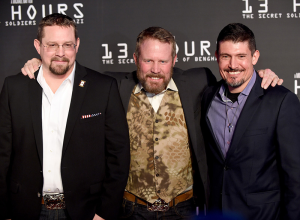
Source: Paramount Pictures
By Liz Lopez
Mark “Oz” Geist, Kris “Tanto” Paronto and John “Tig” Tiegen were in Austin in December conducting interviews on behalf of the film, 13 Hours: The Secret Soldiers of Benghazi which is based on the book, 13 Hours: The Inside Account of What Really Happened in Benghazi, about these men and their experience in Benghazi, and subsequently is the feature film, 13 Hours: The Secret Soldiers of Benghazi. During the interview I learned more about how these came about.
Mark “Oz” Geist was badly injured in the attack and related how he was thinking through things as he lay in the hospital bed. He considered himself more of a “behind the scenes” person, instead of out in public, yet he was angry at the stories being relayed to the media about what had transpired in Benghazi. He stated, “It is a dishonor to those who died.” Geist communicated with fellow operators and found they too had some concerns.
Kris “Tanto” Paronto stated he learned from Jack (Silva) about some inaccurate information. “The truth was not being told.”
The men also related an e-book was published in 2012, shortly after their experiences – approximately one month later.
Geist added, “The straw that broke…were pictures of the ambassador. It was a dishonor.” A decision was made to look for a writer. Paronto added, “We knew if we did the book –vs- media (relating the story), we’d get validation; get both sides.”
Geist stated that their relationship with the writer is good. “He wanted each of us to tell him (our experience) separately; to get the raw events from each of us,” adding that the writer also did his own research.
Paronto added, “He did true journalism; he wrote for Boston Globe. He put down facts. He did a background check on us. Then he’d call – he had contacts.”
After the first draft was completed, they flew to meet each other and review. They are satisfied with the book and feel it relays the truth. Paronto stated, “The book is amazing,” and copies have been donated to high schools in Nebraska, Omaha, and the University of Nebraska.
Geist stated that staff from the literary division of the company they worked with contacted them about the idea of the film and being involved with the pitch. Although some who were approached became skeptical when they heard Benghazi and did not want to participate in it, “Paramount saw that we were determined and wanted to tell our story.” It was agreed to be theatrical, keeping the spirit of the story.
Geist continued, adding that the screenwriter Chuck Hogan would ask questions as he was writing. They were pleased that the filmmakers were trying to get the most accurate information.
They were all on set, working closely with the director and the actors to make sure the film stayed true to the actual events. Geist stated, “Michael Bay is a great person. We were very involved. They wanted us to be.”
John “Tig” Tiegen commented about the set design. “It was almost done,” but he was not in agreement with how the walls were set up, providing a description of the inaccuracy. He recommended a change of walls.
Geist added, “Tig being Tig – they fixed it. Michael Bay said it cost him $100,000, but he’d do it.
Since I do not know when “Tig is being Tig,” I asked them to tell me how important was the accuracy of the wall dimensions on the set to the story. Promptly, Paronto responded, “How willing are they to get this right? Then I believe you are putting forth the effort to tell our story. They earned my respect. They have to earn our respect.”
I understood they have had to relay their stories to the government since 2012 and again to the author and screenwriter, among many others. I asked them if and how difficult it is to recount the events. Tiegen and Paronto stated it was therapeutic. Geist agreed, “I like talking; yes, it is therapeutic. Each one of us has talked to hometown high schools; about overcoming adversity and leadership.”